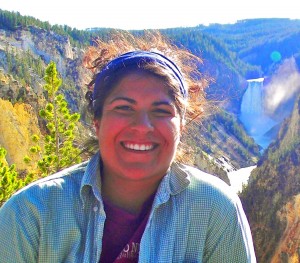
By Heather King
Elsa Rodriguez is currently the Girls Programs Coordinator at the Chicago non-profit Project Exploration (PE). She brings professional scientists and middle school girls together in the south-side of Chicago during the after-school program Sisters4Science, and runs a number of summer programs, including the nationally recognized All Girls Expedition and Junior Paleontologists programs.
Elsa’s love of science and learning was fostered early in childhood. Elsa’s parents are Mexican immigrants, who brought with them to Chicago a deep knowledge and appreciation of the outdoors and the power of nature to support human lives. Elsa says that the knowledge of rural living she learned from her parents contrasted with the urban environment that surrounded her while growing up in Chicago. “This led to curiosity and lots of questions asked about the natural world,” Elsa says. This curiosity led Elsa to discover science as a way of knowing, beginning with a kindergarten science project about how rainbows form.
While a student at Whitney Young High School in Chicago, Elsa became involved with Project Exploration. “They gave me a direction within science, and helped me discover the steps I needed to take to become a scientist,” Elsa says of PE. During their programs, she met professional scientists and not only learned scientific concepts, but the steps the scientists took in their own lives to succeed.
Elsa enrolled at Dartmouth College, and was set on becoming a paleontologist. She majored in geology, and enjoyed many field experiences during her college experience. At the end of her sophomore year, she acted as a mentor in the Summer Enrichment at Dartmouth (SEAD) program, which allows high school students from under-resourced backgrounds to spend time on the Dartmouth campus, interacting with college students. Elsa’s mentee was a first generation Chinese student from the San Francisco/Bay Area with whom Elsa had a lot in common. “This was my first experience with education and outreach, and I loved it!” says Elsa of her SEAD experience that summer. Elsa became more involved in education outreach during the rest of her time in college, including a spring break spent on a South Dakota reservation doing afterschool outreach and working as SEAD staff.
After graduating from Dartmouth, Elsa returned to Chicago, ready to work full time on helping students achieve their goals. She worked for City Year, a non-profit that partners 18-24 year olds with urban students, and helps the students stay on track to graduate from high school. Elsa tutored six 4th graders in Bronzeville for a year, and helped them improve their literacy skills. She also planned afterschool sessions and got first-hand teaching and classroom management experience. “At City Year, I further understood what it meant to be a student in an urban area, and saw everything that goes into educating a child,” Elsa says. “This piqued my interest in working to help students that are falling behind.”
A mantra at Project Exploration is “once you’re part of PE, you’re always part of PE,” and Elsa was no exception. She had kept in touch with Gabe Lyon, the cofounder, since graduating from high school. When Elsa’s year at City Year drew to a close, she heard that PE was looking for a Girls’ Programs Coordinator. “The position was a perfect combination of everything I was interested in, including science, discovery, mentoring, education, and the sharing of different perspectives,” says Elsa. “And the idea of coming back to the place that sparked my path to science was really cool.” Elsa applied for the position and landed it, coming full circle in her Project Exploration experience.
Elsa has some advice for aspiring young women scientists, based on her own journey and on what she’s learned from the many students she’s mentored. “Don’t be afraid to ask for help,” she says. “It took me a long time to understand who to ask for help, and how, in college, and that was really isolating.” She also says to find what you’re most passionate about, to figure out what the end game to that passion is, and to learn what steps to take to reach that goal. “Sometimes people have a romantic vision of what it means to be a scientist, and that can leave you unprepared for reality. Learning what steps other scientists took to reach their career goals can really help you stay on track.” Elsa’s final piece of advice applies to all of us: “Never stop wondering and never forget what it’s like to discover. That feeling keeps you inspired and makes our work meaningful.”
Sometime in the future, Elsa hopes to build on her experiences teaching urban youth by pursuing a graduate degree in urban sociology. We wish her luck in this and all future endeavors!
Elsa is always looking for scientists to share their knowledge and experiences with urban Chicago middle and high school students. If you are interested, contact Elsa at erodriguez@projectexploration.org
Article and nomination by Heather King
Know a scientist you think should be featured in an upcoming “Scientist of the Month” article? Send nominations to communications@awis-chicago.org. Your nominee does not need to be an AWIS member or a woman, but should promote the advancement of women in science, technology, mathematics and engineering.
